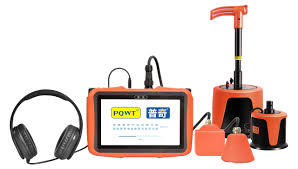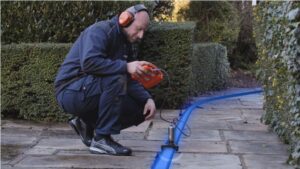To detect underground water leaks, look for unexplained wet spots and listen for hissing sounds. Use specialized leak detection equipment for accuracy.
Underground water leaks can cause significant damage if left untreated. Identifying these leaks early is crucial to prevent costly repairs. Common signs include increased water bills, wet patches on the ground, and reduced water pressure. Professional leak detection services employ advanced tools like acoustic sensors and infrared cameras to locate the source.
Homeowners can also perform initial checks by observing their property for unusual wet areas. Quick action helps mitigate damage and conserve water. Regular maintenance and inspections are vital for the long-term health of your plumbing system.
Is There A Tool To Find A Water Leak Underground?
Underground water leaks can cause big problems. It’s important to find them quickly. There are special tools to help with this job. These tools make it easy and fast to locate leaks.
Acoustic Leak Detectors
Acoustic leak detectors listen for water sounds. They use microphones to hear leaks underground. These tools are very sensitive and can detect even small leaks.
Soil Probes
Soil probes are rods that test the ground. They help find wet areas in the soil. This method is simple and does not need batteries or power.
Thermal Imaging Cameras
Thermal cameras show temperature changes. Water leaks make the ground colder or warmer. These cameras can see these changes and help find the leak.
Pressure Testers
Pressure testers check the pressure in water pipes. A drop in pressure means a leak. These tools are easy to use and can find leaks quickly.
Tracer Gas Detectors
Tracer gas detectors use special gas to find leaks. The gas is put into the pipes. If there is a leak, the gas escapes. The detector then finds the gas above the ground.
Signs Of Underground Leaks
Detecting underground water leaks can save you a lot of trouble. Underground leaks can cause severe damage if not detected early. Knowing the signs can help you take action quickly. Let’s explore some common signs of underground leaks.
Wet Spots In Yard
Wet spots in your yard can indicate underground leaks. Puddles in your yard are not normal. Wet patches can appear even if it hasn’t rained. These spots can be signs of a leaking pipe underground. You might also notice uneven growth of plants. Some plants may grow faster in wet areas. The grass might be greener in some spots. This could be due to extra water from a leak. Also, watch for mushy or soft ground. The soil can become waterlogged from a leak. This can make the ground feel spongy.
- Puddles in the yard
- Uneven plant growth
- Mushy or soft ground
Another sign is sinkholes or depressions. A leak can wash away soil. This can create small sinkholes. These can be dangerous. Keep an eye out for any changes in your yard. Regular checks can help you spot leaks early.
Unusual Water Bills
An unexpected spike in your water bill can signal a leak. Comparing your current bill with previous ones can help. A sudden increase suggests water is being wasted. You might also want to check your water meter. Turn off all water sources in your home. If the meter is still running, there is a leak. This method can help you confirm a leak quickly.
Here’s a simple checklist to follow:
- Compare current and past water bills
- Turn off all water sources
- Check the water meter for movement
Monitoring your water usage can help too. Note down your water usage for a week. Any unexplained increase can be a sign. This method is simple but effective. Keeping track of your water usage can help you spot leaks early.
How Do You Pinpoint An Underground Water Leak?
Underground water leaks can cause big problems. They waste water and can damage property. Detecting these leaks early is important. This guide will help you find and fix underground water leaks.
Check Your Water Meter
A water meter can help find leaks. Turn off all the water in your house. Look at the meter. If it moves, you have a leak. This is a quick and easy way to check for leaks.
Look For Wet Spots
Wet spots in your yard can mean a leak. These spots might be soggy or muddy. They can appear even if it hasn’t rained. Check these spots often.
Listen For Sounds
Leaks can make noise. You might hear hissing or gurgling. Use a stethoscope or listen closely. These sounds can help you find the leak.
Check Your Water Bill
A high water bill can mean a leak. Compare this month’s bill to last month’s. If it’s much higher, you might have a leak. This can be a sign of trouble.
Use Leak Detection Equipment
Special tools can find leaks. Plumbers use these tools. They have sensors and cameras. These tools help find leaks without digging. They can save you time and money.

Using Tools For Detection
Detecting water leaks underground can be tricky. Using the right tools makes it easier. Acoustic sensors and infrared cameras help find leaks efficiently. This guide explains how these tools work.
Acoustic Sensors
Acoustic sensors are popular for detecting underground water leaks. They listen for sounds made by leaking water. These sensors pick up noises that human ears can’t hear. Special microphones are placed near suspected leak areas. The microphones send data to a monitor.
Technicians analyze the sounds to locate the leak. Acoustic sensors are effective because they detect even small leaks. This method is non-invasive and quick.
Here are some benefits of using acoustic sensors:
- Accurate detection of small leaks
- Non-invasive and does not require digging
- Quick results with minimal disruption
Acoustic sensors are ideal for urban areas. They help prevent water wastage and save money on repairs. They are a reliable tool for detecting water leaks underground.
Infrared Cameras
Infrared cameras are another tool for finding underground leaks. They detect temperature changes in the ground. Water leaks cause the ground to cool down or heat up. Infrared cameras capture these changes and create images showing the leak’s location.
Thermal imaging is the technology behind infrared cameras. It is effective and non-invasive. This method helps pinpoint leaks without digging. Infrared cameras are useful for large areas and complex plumbing systems.
Advantages of using infrared cameras include:
- Visual confirmation of leak locations
- Non-invasive and does not require excavation
- Effective for large areas and complex systems
Infrared cameras provide clear images that help technicians identify leaks. They reduce the time and cost of repairs. They are a powerful tool for detecting underground water leaks.
How Do You Diagnose A Hidden Water Leak?
Hidden water leaks can cause big problems. They can damage your home and waste water. It is important to find these leaks early.
Signs Of A Hidden Water Leak
Look for wet spots on your floors or walls. Check for mold or mildew. Listen for dripping sounds even when no water is running. Watch for a higher water bill than usual.
Using Water Meters
Find your water meter. Write down the reading. Do not use water for a few hours. Check the meter again. If the reading has changed, you may have a leak.
Checking Your Water Pressure
Low water pressure can mean a leak. Test the water pressure with a gauge. Attach the gauge to an outside faucet. If the pressure is low, there may be a leak.
Professional Help
Call a plumber if you cannot find the leak. They have special tools. They can find leaks quickly. This can save you money in the long run.
Using Leak Detection Equipment
Special tools can help find leaks. Acoustic devices listen for water sounds. Thermal cameras see temperature changes. Moisture meters measure wet spots. These tools can find leaks without digging.
Diy Methods
Detecting water leaks underground can be tricky. However, there are several DIY methods that can help you spot these leaks early. These methods can save you money and prevent damage to your property. This guide will explain how to use soil moisture tests and pressure testing to find leaks.
Soil Moisture Tests
Soil moisture tests are simple and effective. These tests help you find areas where the soil is wetter than usual. This could indicate a leak. You will need a soil moisture meter for this test.
Follow these steps to conduct a soil moisture test:
- Insert the soil moisture meter into the ground at various locations.
- Check the readings on the meter. Look for spots with higher moisture levels.
- Mark these spots with a flag or stick.
- Check these spots again after a few days.
If the moisture levels remain high, it could indicate an underground leak. This test is easy and does not require advanced tools. Soil moisture tests are a great first step in detecting leaks.
Pressure Testing
Pressure testing is another effective method. This test involves checking the water pressure in your pipes. Changes in water pressure can indicate a leak. You will need a pressure gauge for this test.
Here are the steps to perform a pressure test:
- Turn off all water fixtures in your home.
- Attach the pressure gauge to an outdoor faucet.
- Turn on the faucet and read the pressure gauge.
- Record the initial pressure reading.
- Wait for a few hours without using any water.
- Check the pressure gauge again and record the reading.
If the pressure drops significantly, there may be a leak. Pressure testing is a reliable method. It can help you detect leaks that are not visible on the surface. This test is a bit more technical but still manageable for most homeowners.
Professional Leak Detection
Detecting water leaks underground can save homeowners a lot of money and hassle. Professional leak detection services use advanced tools to pinpoint leaks without digging. This process helps keep your property intact and saves water. Homeowners must understand how professional leak detection works and what to expect when hiring experts. Knowing cost considerations is also essential for budgeting and planning.
Hiring Experts
Hiring experts to detect water leaks underground offers many advantages. Professionals use high-tech equipment that is not available to the average person. This equipment can include acoustic listening devices, ground microphones, and thermal imaging cameras.
Here are some benefits of hiring experts:
- Accurate detection: Professionals pinpoint the exact location of the leak.
- Less damage: No need for extensive digging or property damage.
- Time-saving: Experts can find leaks quickly, saving you time and stress.
- Expert advice: Professionals offer solutions and preventative measures.
Finding the right expert involves some research. Look for certified and experienced professionals. Check online reviews and ask for references. Ensure the company offers a warranty on their services. By doing so, you ensure that you get reliable and efficient service.
Cost Considerations
Understanding the costs involved in professional leak detection is crucial. Costs can vary based on several factors. The size of the property and the complexity of the leak play a role. The type of equipment used also affects the cost.
| Service | Average Cost |
| Basic Leak Detection | $200 – $400 |
| Advanced Detection with Thermal Imaging | $500 – $800 |
| Full Property Survey | $800 – $1200 |
Some companies offer package deals, which can save you money. Always ask for a detailed quote before hiring. This quote should include all potential costs. Comparing multiple quotes can help you find the best deal. Remember, the cheapest option is not always the best. Quality service often comes at a higher price, but it is worth it in the long run.

Preventive Measures
Detecting water leaks underground is crucial. Water leaks can cause serious damage. Taking preventive measures helps avoid costly repairs. Regular inspections and proper landscaping are key. These methods help identify leaks early. Let’s explore these measures in detail.
Regular Inspections
Regular inspections are vital. They help catch leaks early. Inspect your water meter first. Record the reading. Avoid using water for a few hours. Check the meter again. A change indicates a leak. Check for wet spots in your yard. Wet spots can signal underground leaks. Listen for hissing sounds near pipes. These sounds often point to leaks. Use leak detection tools. They can pinpoint the leak’s location. Hire a professional Plumber. They have advanced tools to find leaks.
Regular checks prevent major problems. Look for sudden increases in water bills. This is a common sign of leaks. Inspect all plumbing fixtures. Ensure they are in good condition. Monitor water pressure. Low pressure might mean a leak. Use a pressure gauge for accuracy.
Check your foundation. Cracks can indicate leaks. Inspect your basement. Look for dampness or mold. These are signs of water issues. Regular inspections save money and prevent damage. They are essential for maintaining your home.
Proper Landscaping
Proper landscaping helps prevent leaks. Avoid planting trees near pipes. Tree roots can damage pipes. Choose plants with shallow roots. Maintain your yard’s slope. Ensure water flows away from your home. This prevents water from seeping into the ground. Install a drainage system. It helps direct water away from your home. Use mulch. It retains moisture and reduces water needs.
Check for pooling water. It can indicate poor drainage. Aerate your lawn. It improves soil absorption. Healthy soil prevents water buildup. Use drip irrigation systems. They reduce water wastage. Regularly clean gutters and downspouts. Ensure they direct water away from the foundation.
Inspect your sprinkler system. Look for broken or misaligned heads. These can cause water to pool. Proper landscaping protects your home. It ensures water flows correctly. It helps prevent underground leaks. Simple measures make a big difference.
When To Act
Water leaks underground can cause serious damage if not detected early. These leaks waste water and damage property. Understanding when to act is crucial. Early detection saves money and prevents larger issues. Learn the signs and steps to take for both immediate and long-term solutions.
Immediate Steps
Acting quickly is crucial to minimize damage. Here are some immediate steps:
- Check your water meter: Turn off all taps and appliances. Note the meter reading. Wait an hour without using water. Check the meter again. An increase means there’s a leak.
- Listen for sounds: Place your ear near pipes or the ground. A hissing sound may indicate a leak.
- Inspect your property: Look for wet spots, mold, or unusual growth in your yard. These can be signs of an underground leak.
Using food coloring in the toilet tank is another method. Add a few drops and wait 10 minutes. If color appears in the bowl, there’s a leak. A simple test but very effective.
Another immediate step is to hire a professional plumber. They have specialized tools to detect leaks. Professionals can pinpoint leaks without digging. This saves time and reduces property damage.
Long-term Solutions
Preventive measures help avoid future leaks. Here are some long-term solutions:
- Regular inspections: Schedule yearly plumbing inspections. Professionals can detect potential problems before they become serious.
- Install a leak detection system: These systems monitor water flow. They alert you to unusual patterns, helping you catch leaks early.
- Upgrade old pipes: Replace aging pipes with modern materials. This reduces the risk of leaks and improves water flow.
Maintaining proper water pressure is also important. High pressure can damage pipes. Install a pressure regulator to keep levels safe.
Another long-term solution is landscaping wisely. Avoid planting trees or shrubs near water lines. Roots can grow into pipes and cause leaks.
Educate your household about water conservation. Simple habits like turning off taps properly can prevent leaks. Awareness is key to long-term prevention.

Conclusion
Detecting underground water leaks early can save you money and prevent damage. Utilize modern tools and professional Plumbing services. Regular inspections help maintain your plumbing system. Stay proactive and vigilant to ensure your property remains safe and secure. Don’t ignore potential signs; act swiftly to address any leaks.
